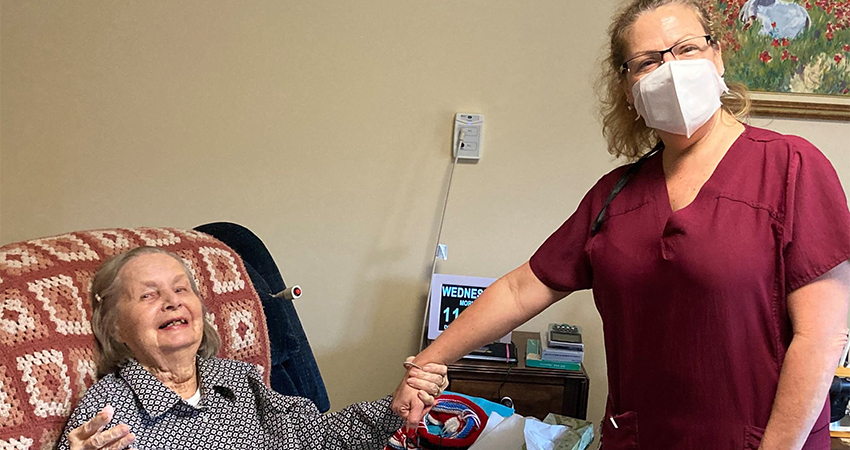When it comes to senior living communities, they come in many shapes and sizes. It’s important to understand that there is no universal process or approach when it comes to aging and one’s needs. There is a common misconception that a senior living community (which provides a variety of senior living options) is the same as a nursing home (which provides more skilled nursing), but over the past few decades those terms are no longer considered interchangeable.
The differences between a skilled nursing facility, aka a nursing home and assisted living?
Assisted living communities provide a unique option for seniors as they age and want to retain their independence but require some assistance with day-to-day activities. Skilled nursing is designed for individuals whose physical or cognitive needs require 24-hour medical supervision. To be clear, skilled nursing is offered in a medical setting, while assisted living is considered a residential setting.
Because skilled nursing helps individuals following a hospitalization or who are in declining health, those in skilled nursing benefit from monitoring and round-the-clock medical care. A resident’s schedule may be more limited based on medical services needed. On the other hand, residents of assisted living enjoy more independence, deciding how often and to what degree they need or want assistance. That’s the short answer, but let’s dive a little deeper.
What is assisted living?
Assisted living is a great housing choice for seniors who are no longer capable of living alone but want to maintain a social, active lifestyle. If a person still has good mobility and is transitioning from an independent living setting, assisted living may be the most appropriate next step to help simplify household management and be in a community of peers. Many seniors feel like assisted living will be restrictive, lonely, and even boring. However many assisted living communities offer:
- Restaurant-style dining
- Activities based on resident interest including holiday celebrations and even happy hours.
- Outings and transportation to local stores, theaters, and museums
- Help with daily activities like chores.
- Personal care assistance
- Suites with kitchens, or larger apartments that allow couples to age together.
Who is assisted living the most beneficial for?
Those who:
- Need minor nursing assistance or medication but don’t require full-time medical care.
- Need help with daily activities like dressing and bathing.
- Are interested in a maintenance-free lifestyle without lawn care or home repairs.
- Desire an active life but don’t have access to transportation.
- Are looking for new friends or social activities.
- Are currently in good health but know they’ll need more help soon.
- Can walk and stand independently.
- Don’t have severe cognitive issues.
What is skilled nursing?
A nursing home provides the highest level of care possible outside of a hospital. In fact, many seniors move to a nursing home following a hospital stay. Skilled nursing can be ideal for seniors who require 24-hour monitoring and medical assistance or for those who have recently undergone a major surgery or are battling an illness that requires rehabilitation. They can be a much less stressful and costly option for care compared to family members or 24-hour visiting nursing staff. Typical nursing home residents may suffer from physical or mental conditions that leave them unable to live independently or in need of daily skilled nursing care. Not every senior is able to live in a skilled nursing facility, it requires a physician’s prescription and physical examination before being accepted. Skilled nursing care’s goal is to provide safety and comfort to older adults who need access to round-the-clock care.
Who is skilled nursing care the most beneficial for? Those who:
- Need ongoing care.
- Need assistance with activities of all daily living.
- Require prescription medication management and administration, including injections.
- Participate in specialized rehabilitative services, such as speech, occupational, physical, respiratory, cognitive, and vocational therapy.
- Need meal options that must meet the daily nutritional requirements and/or have unique dietary needs.
One of the biggest differences between these two care options is the amount of medical care provided for residents. Assisted living residents may only need a moderate amount of care or just want the peace of mind knowing someone’s there to help if needed. Skilled nursing patients require 24-hour nursing care and medical supervision.
Cost structure – how do they differ? Skilled nursing care costs more than assisted living because of the round-the-clock medical care required for skilled nursing residences. Typically assisted living costs thousands of dollars less each month than skilled nursing but is not covered by any insurance. For the individual requiring skilled nursing there are options to help cover these costs, including insurance, Medicare or Medicaid. Noble Horizons does accept Connecticut Medicaid. Each state has a widely varying set of requirements and level of insurance coverage.
If you aren’t sure the best option for yourself or a loved one, we are always available to answer your questions. Contact us today.

